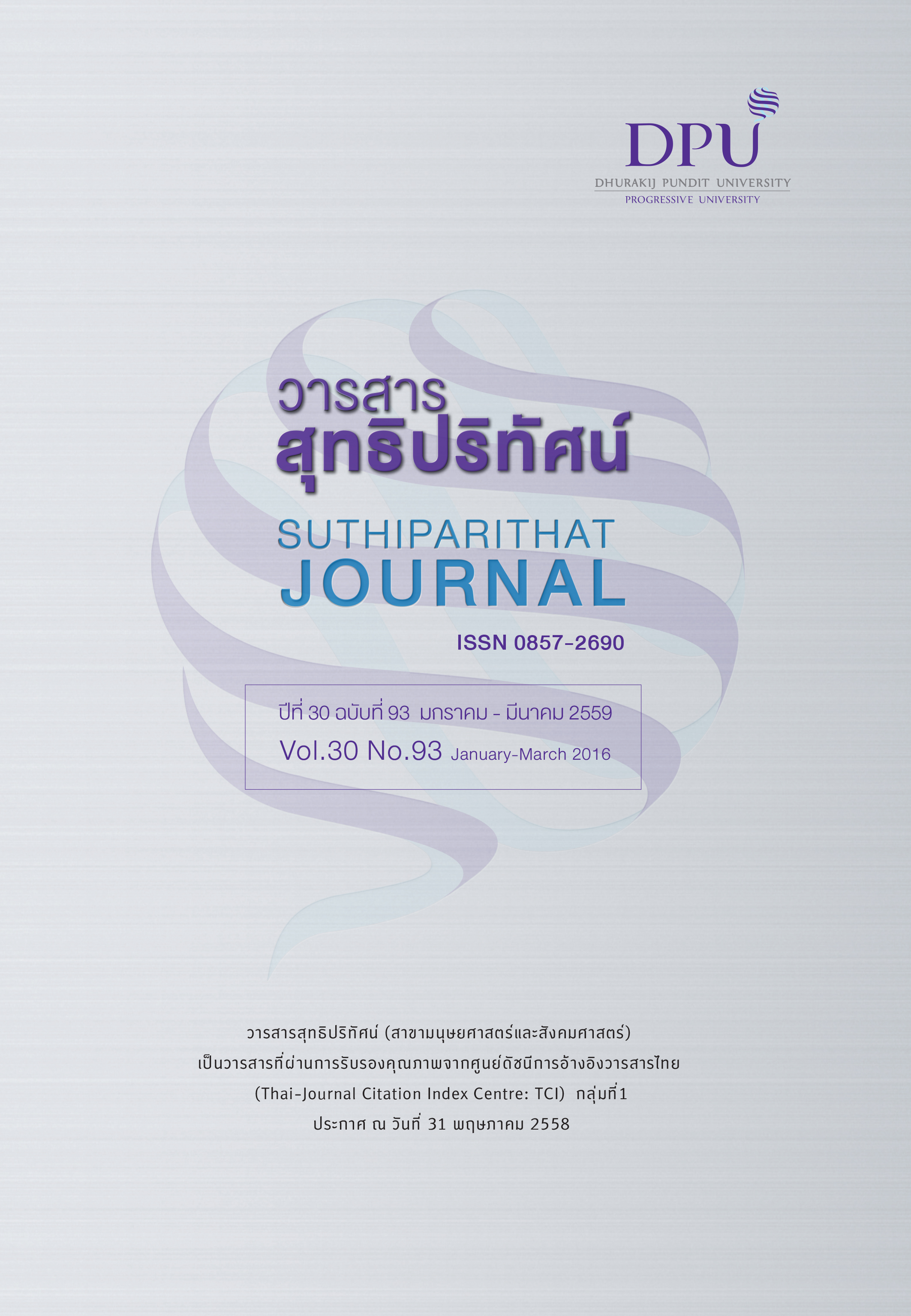การเปรียบเทียบการจัดนำเที่ยวเชิงนิเวศของผู้ประกอบการเพื่อพัฒนาธุรกิจการท่องเที่ยวสีเขียวอย่างมีคุณภาพ: กรณีศึกษาผู้ประกอบการในเกาะภูเก็ตและเกาะบาหลี
คำสำคัญ:
การท่องเที่ยวสีเขียว, การท่องเที่ยวเชิงนิเวศ, การท่องเที่ยวอย่างยั่งยืน, ประเทศไทยบทคัดย่อ
งานวิจัยในครั้งนี้มีวัตถุประสงค์การวิจัยเพื่อ 1) ศึกษาและเปรียบเทียบการจัดนำเที่ยวเชิงนิเวศ ของผู้ประกอบการในเกาะภูเก็ตและเกาะบาหลี และ 2) วิเคราะห์การจัดนำเที่ยวเชิงนิเวศของผู้ประกอบการกับหลักของการท่องเที่ยวเชิงนิเวศ โดยใช้เครื่องมือวิจัยที่สร้างขึ้นจากงานวิจัยในอดีตที่ได้กำหนด หลักเกณฑ์และตัวบ่งชี้คุณลักษณะของความเป็นผู้ประกอบการธุรกิจจัดนำเที่ยวเชิงนิเวศ หรือเรียกว่า 6 E’s Ecotourism Model for Tour Operators (EMTO) เพื่อนำมาใช้ประเมินการจัดนำเที่ยวเชิงนิเวศของโดยจงเจาะเลือกผู้ประกอบการ 4 รายในทั้งสองเมืองท่องเที่ยวเพื่อเป็นกรณีศึกษา และการเก็บรวบรวม ข้อมูลโดยการสังเกตและการสัมภาษณ์ โดยใช้การวิเคราะห์เนื้อหา ผลการวิจัยพบว่าผู้ประกอบการทั้ง 4 ราย ในเกาะภูเก็ตและเกาะบาหลีมีลักษณะการจัดนำเที่ยวเชิงนิเวศส่วนใหญ่สอดคล้องกับหลักการของ การท่องเที่ยวเชิงนิเวศ และเป็นผู้ประกอบการจัดนำเที่ยวเชิงนิเวศที่มีคุณภาพ อย่างไรก็ตาม การจัดนำเที่ยวในบางกิจกรรมยังไม่สอดคล้องกับหลักการของการท่องเที่ยวเชิงนิเวศอย่างแท้จริง ผู้วิจัยจึงได้เสนอ แนะแนวทางการจัดนำเที่ยวเชิงนิเวศ (Tour Conduct) สำหรับผู้ประกอบการเพื่อเป็นแนวทางการพัฒนา ธุรกิจการท่องเที่ยวสีเขียวอย่างมีคุณภาพ
เอกสารอ้างอิง
Armstrong, K. & Weiler, B. (2002). Getting the message across: An analysis of messages delivered by tour operators in protected areas. Journal of Ecotourism, 1(2/3), 104-121.
Asasupakit, S. (1999). An investigation of determining factors in the readiness criteria of eco-tour operators in upper northern Thailand (Master thesis). Chiang Mai: Chiang Mai University.
Barber, N.A. (2012). Profiling the potential green hotel guests: Who are they and what do they want? Journal of Hospitality & Tourism Research, 10(3), 158-170.
Blamey, R.K. (2001). Principles of ecotourism. In D.B. Weaver (ed.) The Encyclopedia of Ecotourism. Oxford: CAB International.
Buckley, R. (1994). A framework for ecotourism. Annals of Tourism Research, 21(3), 661-669.
Buckley, R. (2009). Ecotourism: Principles and practices. Oxford, UK: CABI.
Boo, E. (1991). Planning for ecotourism. Parks, 2(3), 4-8.
Cheung, L. & Fok, L. (2014). Assessing the role of ecotourism training in changing participants’ pro-environmental knowledge, attitude and behaviour. Asia Pacific Journal of Tourism Research, 19(6), 645-661.
Donohoe, H. & Needham, R. (2008). Internet-based ecotourism marketing: Evaluating Canadian sensitivity to ecotourism Tenets. Journal of Ecotourism, 7(1), 15-43.
Ecotourism Australia. (2008). Ecotourism Australia. Retrieved 15 August 2015, from http://www.ecotourism.org.au
Ecotourism Norway. (2009). Ecotourism in Norway. Retrieved 15 August 2015, from http://www.visitnorway.com/en/Stories/Theme/Ecotourism-Norway
Erdogan, N. & Tosun, C. Environmental performance of tourism accommodations in the protected areas: Case of Goreme Historical National Park. International Journal of Hospitality Management. 28(3), 406-414.
Esparon, M, Gyuris, E., & Stoeckl, N. (2014). Does ECO certification deliver benefits? Journal of Sustainable Tourism, 22(1), 1498-169.
Fennell, D. (2003). Ecotourism: An introduction (2nd ed.). London: Routledge.
Font, X. & Tribe, L. (2001). Promoting green tourism: the future of environmental awards. International Journal of Tourism Research, (3), 9-21.
Font, X. (2002). Environmental certification in tourism and hospitality: progress, process and prospects. Tourism Management. 23, 197-205.
Furqn, A., Mat Som, A., & Hussin, R. (2010). Promoting green tourism for future sustainability. Theoretical and empirical researches in urban management, 8(17), 64-74.
Goodwin, H. (1996). In pursuit of ecotourism. Biodiversity and Conservation, 5(3). 277-291.
Hong, W.C. (2009). Global competitiveness measurement for the tourism sector. Current Issues in Tourism, 12(2), 105-132.
International Ecotourism Society. (2009). Ecotourism guidelines for nature tour operators. Retrieved 15 August 2015, from http://www.bigvolcano.com.au/ercentre/codes.htm
Jarvis, N., Weeden, C., & Simcock, N. (2010). The benefits and challenges of sustainable tourism certification: A case study of the Green Tourism Business Scheme in the West of England. Journal of Hospitality and Tourism Management, 17, 83–93
Kasim, A. (2006). The need for business environmental and social responsibility in the tourism industry. International Journal of Hospitality and Tourism Administration, 7(1), 1-22.
Kontogeorgopoulos, N. (2003). Towards a Southeast Asian model of resort based ‘mass ecotourism’: Evidence from Phuket, Thailand and Bali, Indonesia. ASEAN Journal on Hospitality and Tourism, 2(1), 1-16.
Kontogeorgopoulos, N. (2004). Conventional tourism and ecotourism in Phuket, Thailand: Conflicting paradigms or symbiotic partners? Journal of Ecotourism, 3(2), 87-108.
Kutay, K. (1989). The new ethic in adventure travel. The Environmental Journal, 1(4), 30-36.
Martha, H. (2008). Who owns paradise? Washington, DC: Island Press
Matysek, K.A. and Kriwoken, L.K. (2003). The natural state: Nature-based tourism and ecotourism accreditation in Tasmania, Australia. Journal of Quality Assurance in Hospitality and Tourism, 4(1/2), 129-145.
Rangsit University. (2004). The Reviews and the operational projects of national ecotourism policy 2005-2006. Bangkok: Rangsit University.
Patterson, C. (2002). The business of ecotourism. Rhinelander, Wisconsin: Explorer’s Guide Publishing.
Sangpikul, A. (2010). Marketing ecotourism through the Internet: A case of ecotourism business in Thailand. International Journal of Hospitality and Tourism Administration, 11(2), 65-79.
Sangpikul, A. (2011). Developing good practices for ecotourism tour operators. Sasin Journal of Management, 17(1), 53-86.
Sangpikul, A. (2014). Good practices of ecotourism tour operators for developing the standard of eco tours among ASEAN countries: Thailand, Malaysia, and Indonesia (research report). Bangkok: Dhurakij Pundit University.
Sangpikul, A. (2015). An investigation of ecotourism practices of tour operators in Thailand, Malaysia, and Indonesia. Modern Management Journal, 13(2), 153-172.
Srisuwan, S. (2004). Attitude of tour operators in Bangkok toward ecotourism operation (Master thesis). Bangkok: King Mongkut’s Institute of Technology Ladkrabang.
Sirirak, P & Kurit, N. (2011). Factors influencing on tourists’ ecotourism behavior in Phuket. Srinakharinwirot Business Journal, 2(1), 96-108.
The International Ecotourism Society. (2015). What is ecotourism? Retrieved 20 September 2015, from http://www.ecotourism.org/what-is-ecotourism
Tseng, C. & Kuo, Y. (2013). The Measurement of eco-components of service quality in Taiwan’s international tourist hotels. International Journal of Organizational Innovation, 5(3), 247-260.
Weaver, D. (2001). Ecotourism. Milton: John Wiley & Sons Australia.
Wight, P. (1993). Ecotourism: ethics or eco-sell? Journal of Travel Research, 31(3), 3-9.
Wong, I, Wan, Y., & Qi, S. (2015). Green events, value perceptions, and the role of consumer involvement in festival design and performance. Journal of Sustainable Tourism, 23(2), 294-315.
World Tourism Organization (UNWTO). (2010). Sustainable tourism development. Retrieved 15 July 2015, from http://www.unwto.org/sdt
ดาวน์โหลด
เผยแพร่แล้ว
รูปแบบการอ้างอิง
ฉบับ
ประเภทบทความ
สัญญาอนุญาต
เนื้อหาและข้อมูลในบทความที่ลงตีพิมพ์ในวารสารสุทธิปริทัศน์ ถือเป็นข้อคิดเห็นและความรับผิดชอบของผู้เขียนบทความโดยตรงซึ่งกองบรรณาธิการวารสาร ไม่จำเป็นต้องเห็นด้วย หรือร่วมรับผิดชอบใด ๆ
บทความ ข้อมูล เนื้อหา รูปภาพ ฯลฯ ที่ได้รับการตีพิมพ์ในวารสารสุทธิปริทัศน์ ถือเป็นลิขสิทธิ์ของวารสารสุทธิปริทัศน์หากบุคคลหรือหน่วยงานใดต้องการนำทั้งหมดหรือส่วนหนึ่งส่วนใดไปเผยแพร่ต่อหรือเพื่อกระทำการใด ๆ จะต้องได้รับอนุญาตเป็นลายลักษณ์อักษรจากวารสารสุทธิปริทัศน์ก่อนเท่านั้น







